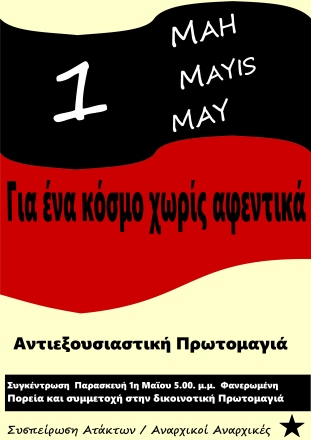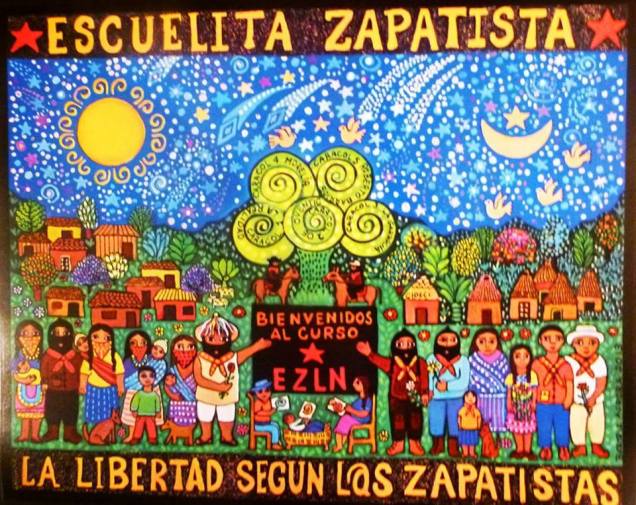
‘’However, as it is always the case in the history of mankind, the dominant story of those who are at the top and within the system is contrasted with the “other” story of those who are at the bottom and outside the established political routines. Alongside the story of obedience and oppression, the history of mobilization and resistance is also written. With the continuous development of exploitation and destruction, there is the story of justice, equality and freedom, solidarity, dignity and autonomy, emerging from the bottom of the social stratification and the margins of the political system.
This “other” story from those who are at the bottom and outside the established political routines might be following an underground route, but it exists. It might not appear in the coloured front pages of newspapers or the central broadcasting TV news, but it emerges from deep within the earth, where the treadmill of production and consumption is based, disrupting its operation and challenging its hegemony. Within the beheaded mountains and clear-cut forests of the North-eastern Chalkidiki, in the area of Skouries, it is not only the story of the rich, rulers and oppressors that is written, but also that of the poor, the weak and the oppressed.
It is in this “other” story that our own struggles also belong to. Alongside these ordinary people and remote communities we also stand, as a small but active part of the anticapitalist and antiauthoritarian movements across the world, who have chosen to take action and demonstrate their solidarity with the struggle for the protection of the area of Skouries in Northeast Chalkidiki.’’
Statement of Syspirosi Atakton
Saturday, 9 November 2013
International Day of Action Against Gold Mines in Chalkidiki
It’s been almost two years since the International Day of Action Against Gold Mines in Chalkidiki, when we decided to join the struggle of the local ecological and social movement, against the plans of the multinational corporation Eldorado – Hellas Gold and the policies of the governments supporting the memorandum of the Greek state.
For us, such a decision could not have been limited to a simple statement or a symbolic action. Our decision was based on a deep awareness that struggles cannot be won through big words and communication stunts, neither through representation, assignment and taking governing power governance.
Thus, we weren’t surprised from the fact that no political party, no government and no institution could stop Eldorado at Skouries nor could protect Kakavos from mining. Historical experience shows clearly that the policies of both liberal and conservative Right and of the social democratic and reformist Left, subordinate to the dictates of the elite and of the capital once they take the governmental ‘throne’.
However, we were pleasantly surprised that the residents and communities chose to carry the fight to save the forest of Skouries, dynamically, with self-organization, and without intermediaries. Their stance is the one that keeps the case Skouries alive and is the one that gives us hope for a different society.
With these considerations, we chose to contribute to the emergence of the “other” story, the one of the bottom and from the outside. Together with our comrades in the transnational network Beyond Europe – an antiauthoritarian platform against capitalism – we organized the international camp from 18 to 25 August 2015, in which people from all over Europe had the chance to experience first-hand what is happening in Skouries, but also to convey their own experiences of other local struggles on the commons and degrowth, self-organization and self-management, social movements and power.
The struggle at Skouries goes on and we will keep being on the side of the local ecological and social movement. Regardless of state repression, police violence and chemical warfare; beatings of demonstrators, prosecutions of activists and attacks against trade unionists; regardless of the government postponements, administrative suspensions and court decisions; and certainly regardless of the investment plans of Eldorado which still thinks that is in charge of the area.
From our small corner of the world, we send our greetings and express our solidarity with the Youth Assemblies and the Coordinating Committees of the Communities of Ierissos, Nea Roda, Ouranoupolis Megali Panagia, which hosted and inspired us.
We do not retreat, we do not compromise; we move on and keep fighting!
No gold mining, never and nowhere!
WE WANT OUR FORESTS, LAND AND WATER
NOT A GRAVE MADE OUT OF GOLD!
Syspirosi Atakton
Nicosia, Cyprus
Saturday, 5 September 2015





 On the occasion of the first Prides (one in the North and one in the South) in Cyprus, we want to share our reflections on matters relating to the acknowledgement of the right to agency that every person should have over their own body, sexuality, and gender identity. Referring mostly to the pride which takes place in the south, we feel that we should clarify this: although it is organised “under the protection” of the institutional authority (so as to exercise social pressure on the issue of acceptance, regardless of sexual orientation or gender expression/gender identity), is being carried out first and foremost by the LGBTQ community, claiming visibility for the persons of the LGBTQ community, claiming inclusion for all genders and sexualities that have been oppressed over the years and are still oppressed within the well-established system of heteronormativity. The counteraction of those, who are oppressed, especially when it’s formed and run by the oppressed people themselves, should enjoy support from the whole society and especially from the antiauthoritarian scene: not in recognising the constitutional authorities that may lie behind the organisation of the Pride, but in participating, supporting, and connecting with a community that defends its right to be included in the social representations and claims respect for all, regardless of sexual orientation and/or gender identity.
On the occasion of the first Prides (one in the North and one in the South) in Cyprus, we want to share our reflections on matters relating to the acknowledgement of the right to agency that every person should have over their own body, sexuality, and gender identity. Referring mostly to the pride which takes place in the south, we feel that we should clarify this: although it is organised “under the protection” of the institutional authority (so as to exercise social pressure on the issue of acceptance, regardless of sexual orientation or gender expression/gender identity), is being carried out first and foremost by the LGBTQ community, claiming visibility for the persons of the LGBTQ community, claiming inclusion for all genders and sexualities that have been oppressed over the years and are still oppressed within the well-established system of heteronormativity. The counteraction of those, who are oppressed, especially when it’s formed and run by the oppressed people themselves, should enjoy support from the whole society and especially from the antiauthoritarian scene: not in recognising the constitutional authorities that may lie behind the organisation of the Pride, but in participating, supporting, and connecting with a community that defends its right to be included in the social representations and claims respect for all, regardless of sexual orientation and/or gender identity.
 Compañeros y Compañeras.
Compañeros y Compañeras.